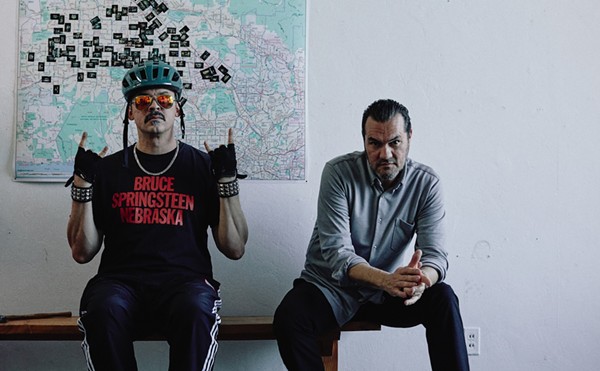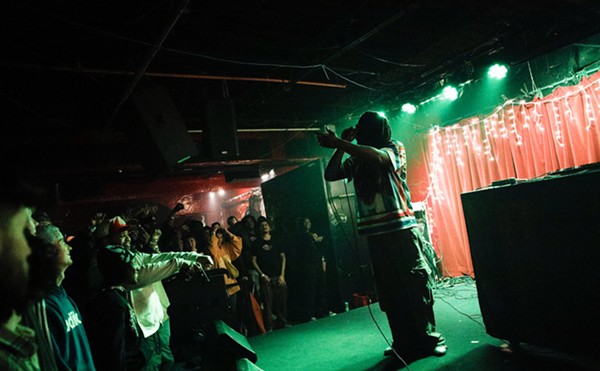Chaos is virtually a way of life for de Babalon, who's in the midst of preparing to embark on his first U.S. tour (he played once in New York last year) in support of If You're Into It I'm Out of It, an album that initially came out in 1997 but was rereleased earlier this year on Alec Empire's noisy Digital Hardcore Recordings (DHR). While DHR is known more for Atari Teenage Riot's speed-metal-influenced drum 'n' bass, de Babalon comes at electronic music from a different perspective. "Opium," the opening track on If You're Into It I'm Out of It, is 15 minutes of cascading synthesizers that have more in common with the minimalist work of Philip Glass than most hardcore techno music. Along with equally somber tracks such as "High Life (Theme)" and "Brilliance" -- both of which sound like they could be incidental music for the Exorcist soundtrack -- "Opium" is representative of de Babalon's current interest in classical music. De Babalon says his next album will be a symphony of sorts, consisting of long songs with lots of string arrangements.
"I'm using mostly classical strings, but they're real strings," he says. "I've never used Wagner, but I will. I'm using a lot of different equipment now. I was using very simple equipment for the first three or four years, and now I have a Macintosh and all that crap, which you have to have. It's a lot more fun, because it's a completely different environment and much more flexible. My music is also changing. Maybe people outside listening to my music won't see the change, because the atmosphere hasn't changed, but I have this vision that's hard to express, because it's a sensual, emotional type of thing, and it's hard to put it into words."
Initially, de Babalon, who says he was inspired early on by English grindcore, was interested in making electronic music that was loud and noisy. He started laying down his first tracks when he was in his early teens. At that time, he had a simple drum machine that he would crank up to 500 bpm while he and his friends screamed the vocals. Shortly afterward, he played in a band before deciding that he would be better off on his own -- but not because he didn't want to be part of a democratic unit.
"One day, the whole thing about having a band really failed, just because I couldn't work with anyone anymore," he explains. "It's not that I had a problem with people having other ideas. It was that they had no ideas, and I had to tell them everything. One day, I decided that I had to do it on my own."
By 1992, de Babalon had founded the label, Cross Fade Entertainment (CFE), with New Zealand DJ Paul Snowden, and in addition to putting out a single called "We Declare War," which de Babalon recorded with Snowden, CFE released singles by Unit Moebius and Somatic Responses. While de Babalon says he doesn't want CFE to have a singular aesthetic, he does hope to put out music that is challenging and different, even if it's too sparse or avant garde to fit into the current drum 'n' bass scene.
"Sometimes you can use sterility to your advantage," he says. "Sometimes it's a nice way to express some ideas or aesthetic. But I don't like genres like drum 'n' bass too much -- people making music for just one crowd is so limited. I'm not into electronic music, as if it's a youth movement or something. That's very boring and has nothing do with music. That's just identification with a fashion. It's difficult to really say what I'm looking for in music. It just has to strike me. It can be very silent, it can be very noisy, or it can be very mainstream, but it has to be well-done. That's why I can like Merzbow, Puff Daddy, and John Cage. They all give me as much. Well, maybe not, but you get the picture."
In addition to working on another studio release, de Babalon has completed a 12-inch with Kid606 and contributed songs to forthcoming releases on Mille Plateaux and Decode Records, German labels that are well-respected within the electronic dance scene. In addition, he has remixed the song "Musik Wird Ueberfluessig" for a German compilation. Not that de Babalon, who was born and raised in Hamburg, feels a great affinity for all things German (in fact, he admitted he would have rather moved to London than Berlin, but it was too expensive). After all, he has nothing but disdain for Rammstein, the German band that had enormous success in the States with the single "Du Hast" and an outlandish tour that featured more pyrotechnics than you'll see on the Fourth of July.
"I'm not into that scene," de Babalon says when asked about Rammstein. "I was surprised that David Lynch put them on the Lost Highway soundtrack. Maybe they were right for that film, I don't know. It's a shame that they are the most popular German band in America. I like the Scorpions more than Rammstein, if I have to compare the two. They're more honest, I think. But really, they're both just shit."













